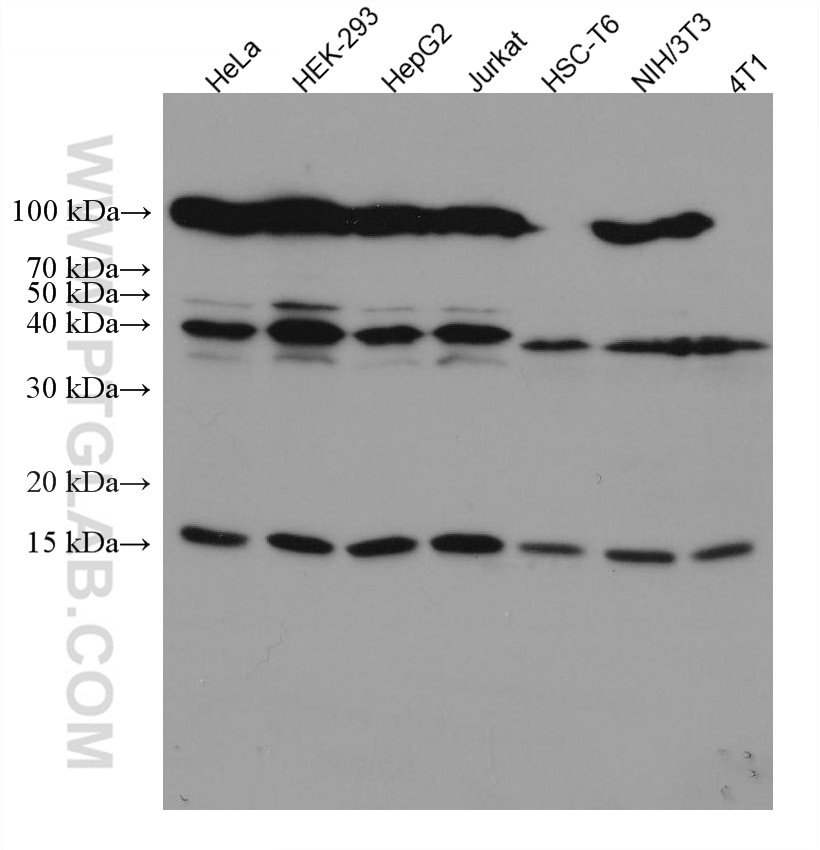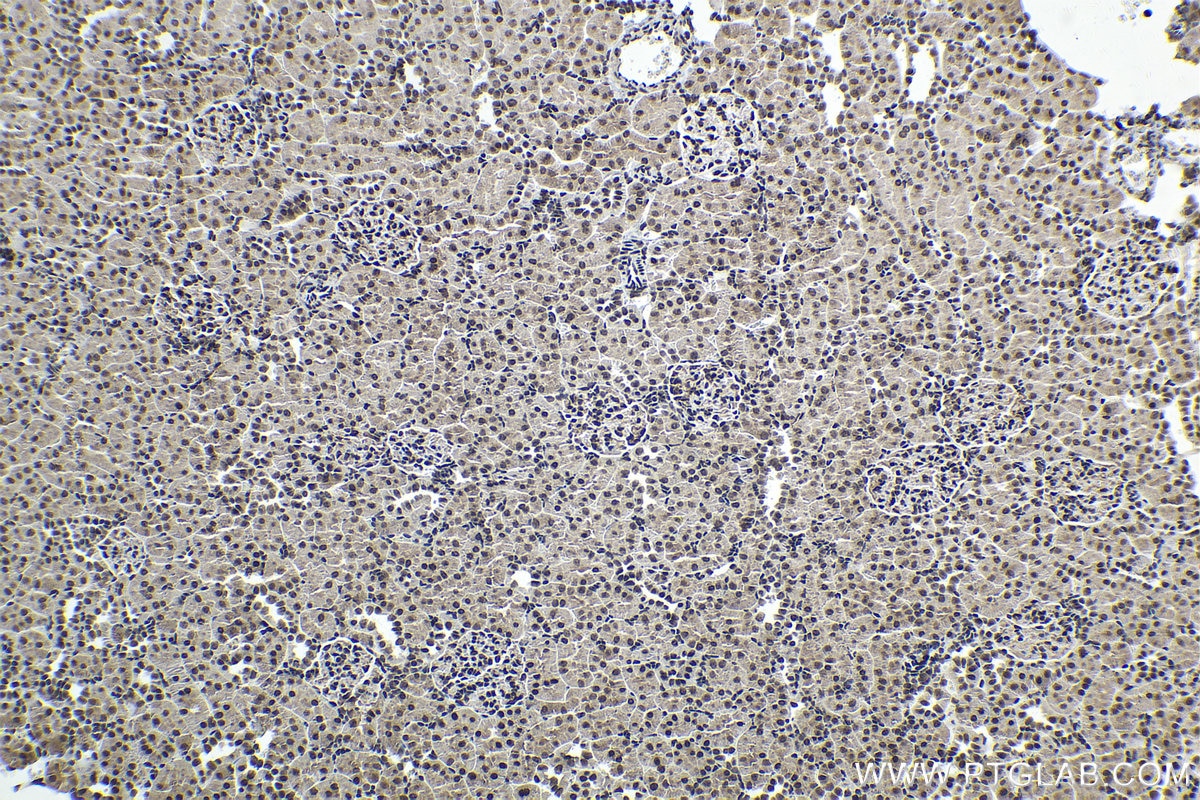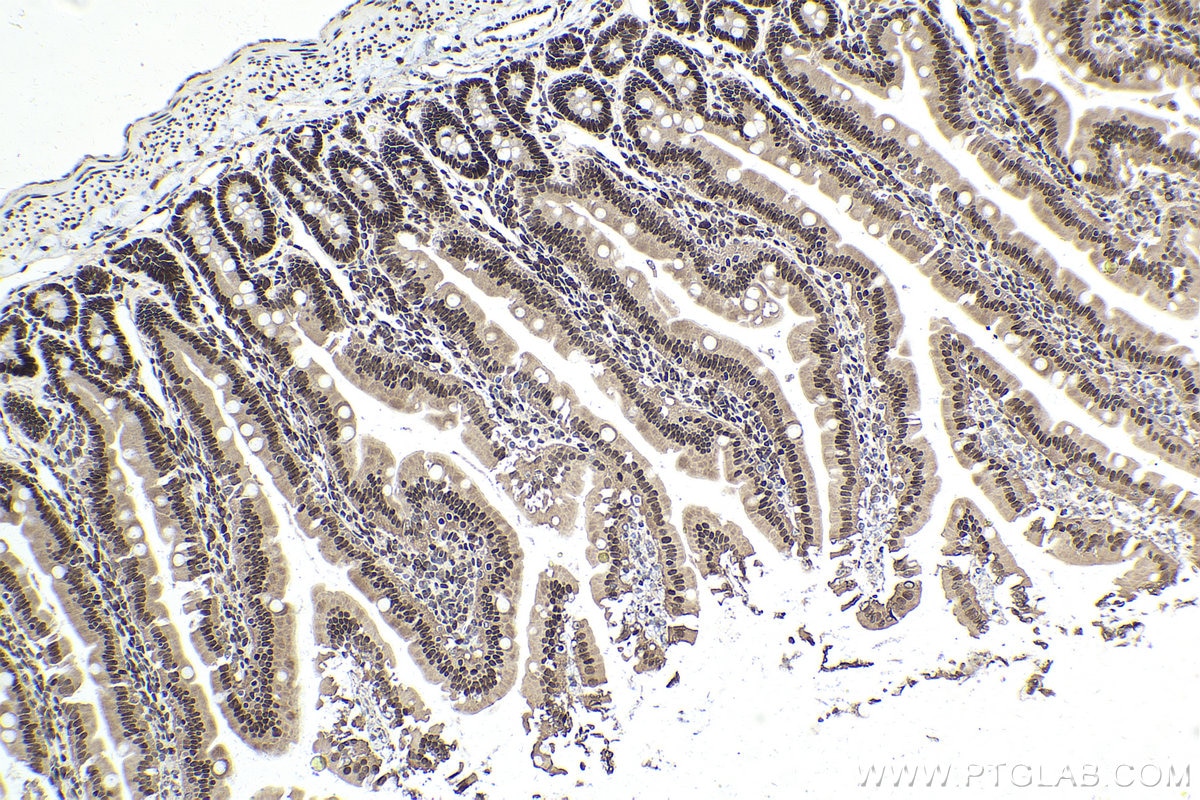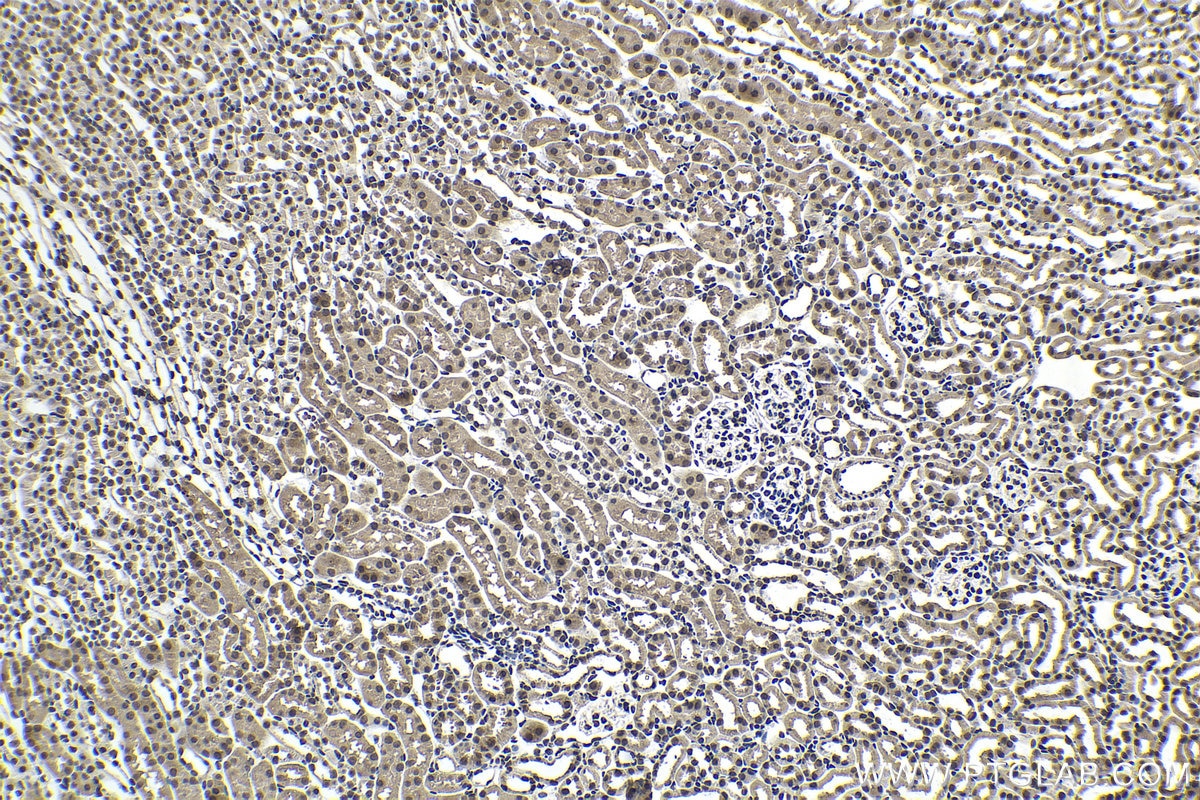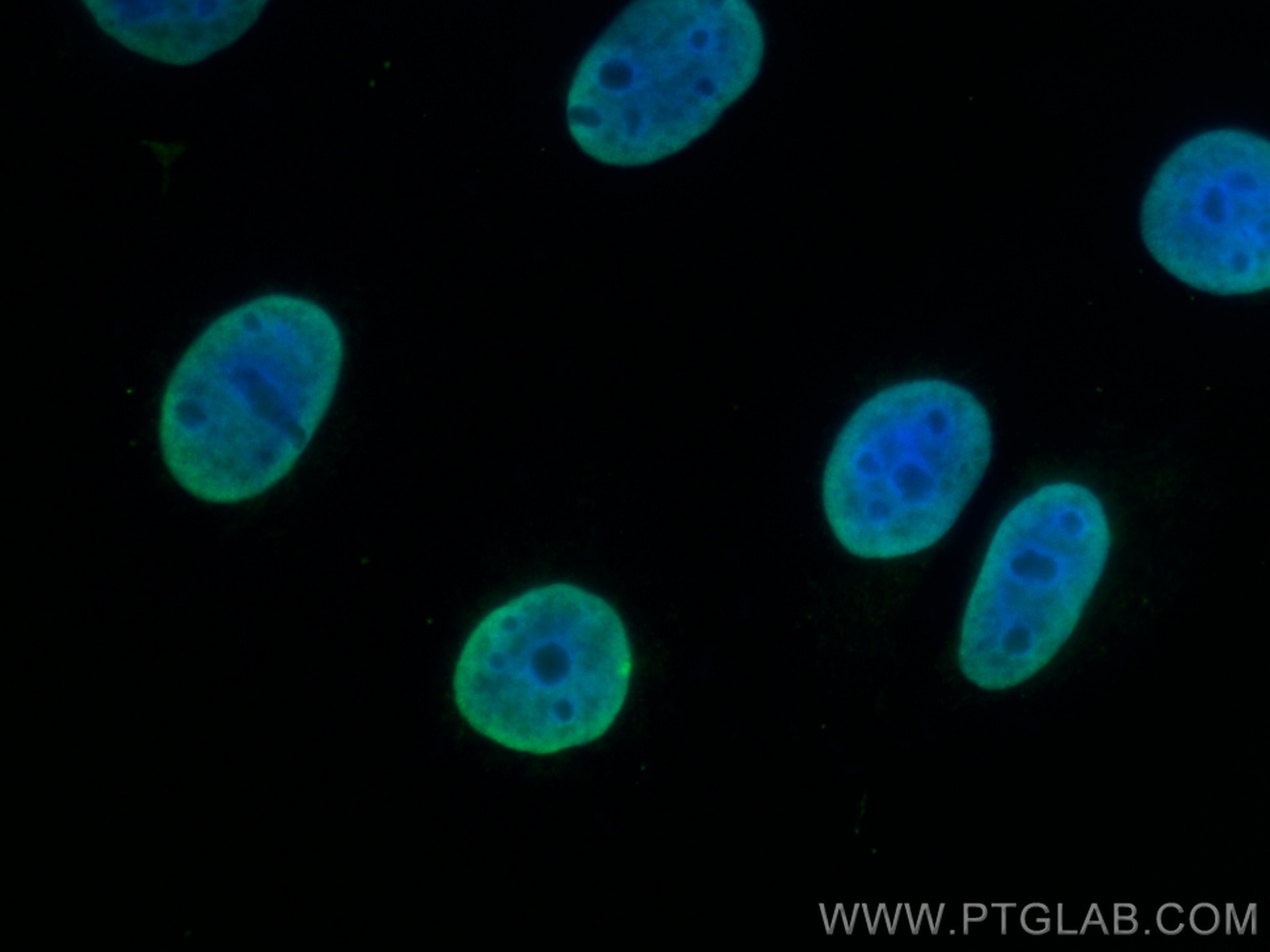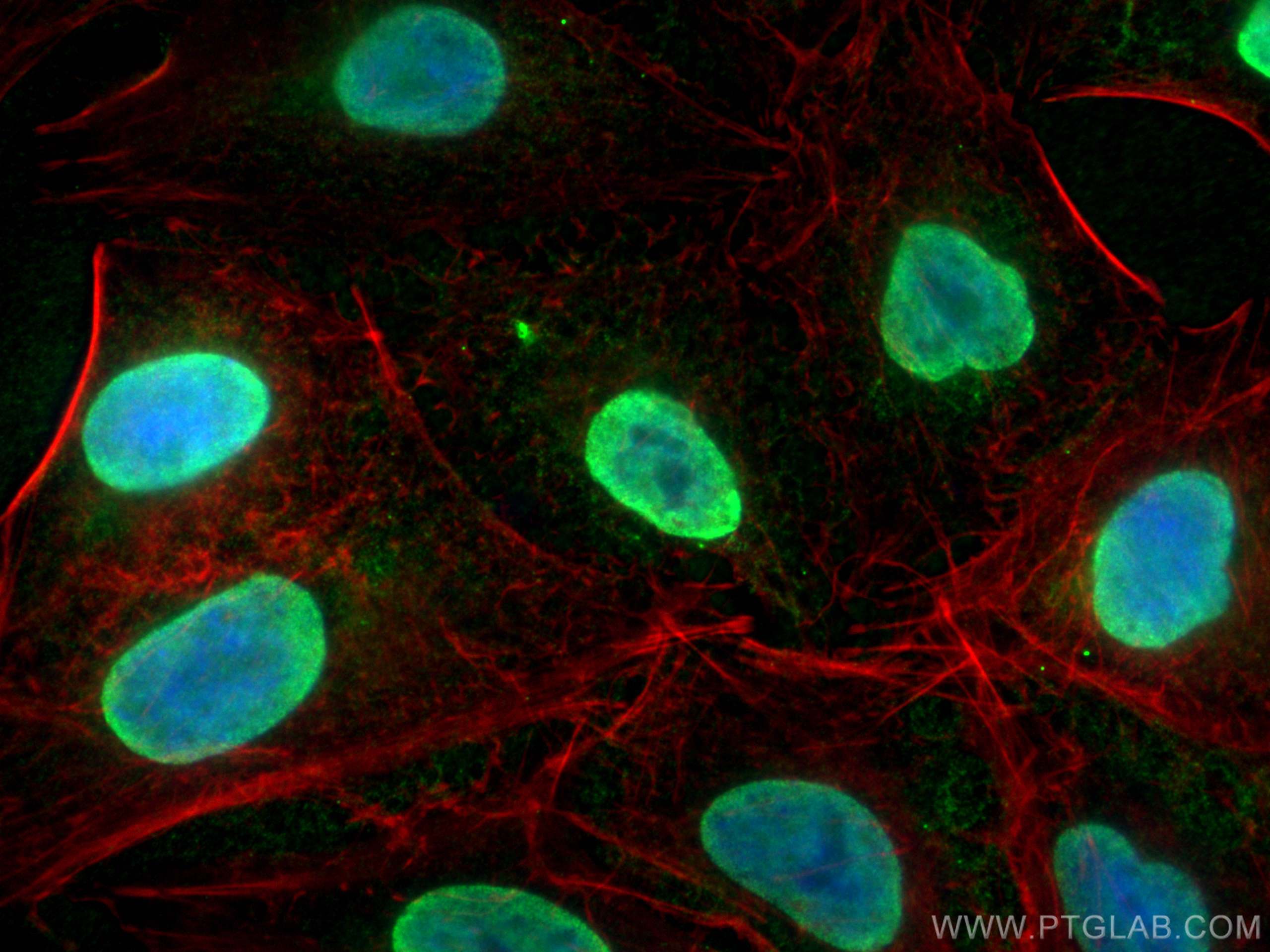SUMO1 Monoklonaler Antikörper
SUMO1 Monoklonal Antikörper für WB, IHC, IF/ICC, ELISA
Wirt / Isotyp
Maus / IgG1
Getestete Reaktivität
human, Maus, Ratte
Anwendung
WB, IHC, IF/ICC, IP, ELISA
Konjugation
Unkonjugiert
CloneNo.
3B5B5
Kat-Nr. : 67559-1-Ig
Synonyme
Geprüfte Anwendungen
| Erfolgreiche Detektion in WB | HeLa-Zellen, 4T1-Zellen, HEK-293-Zellen, HepG2-Zellen, Jurkat-Zellen, NIH/3T3-Zellen |
| Erfolgreiche Detektion in IHC | Mausnierengewebe, Rattennierengewebe, Ratten-Dünndarmgewebe Hinweis: Antigendemaskierung mit TE-Puffer pH 9,0 empfohlen. (*) Wahlweise kann die Antigendemaskierung auch mit Citratpuffer pH 6,0 erfolgen. |
| Erfolgreiche Detektion in IF/ICC | MCF-7-Zellen, A549-Zellen |
Empfohlene Verdünnung
| Anwendung | Verdünnung |
|---|---|
| Western Blot (WB) | WB : 1:1000-1:6000 |
| Immunhistochemie (IHC) | IHC : 1:500-1:2000 |
| Immunfluoreszenz (IF)/ICC | IF/ICC : 1:800-1:3200 |
| It is recommended that this reagent should be titrated in each testing system to obtain optimal results. | |
| Sample-dependent, check data in validation data gallery | |
Veröffentlichte Anwendungen
| WB | See 1 publications below |
| IF | See 1 publications below |
| IP | See 1 publications below |
Produktinformation
67559-1-Ig bindet in WB, IHC, IF/ICC, IP, ELISA SUMO1 und zeigt Reaktivität mit human, Maus, Ratten
| Getestete Reaktivität | human, Maus, Ratte |
| In Publikationen genannte Reaktivität | human, Maus |
| Wirt / Isotyp | Maus / IgG1 |
| Klonalität | Monoklonal |
| Typ | Antikörper |
| Immunogen | SUMO1 fusion protein Ag29402 |
| Vollständiger Name | SMT3 suppressor of mif two 3 homolog 1 (S. cerevisiae) |
| Berechnetes Molekulargewicht | 12 kDa |
| Beobachtetes Molekulargewicht | 15-100 kDa |
| GenBank-Zugangsnummer | BC006462 |
| Gene symbol | SUMO1 |
| Gene ID (NCBI) | 7341 |
| Konjugation | Unkonjugiert |
| Form | Liquid |
| Reinigungsmethode | Protein-G-Reinigung |
| Lagerungspuffer | PBS with 0.02% sodium azide and 50% glycerol |
| Lagerungsbedingungen | Bei -20°C lagern. Nach dem Versand ein Jahr lang stabil Aliquotieren ist bei -20oC Lagerung nicht notwendig. 20ul Größen enthalten 0,1% BSA. |
Hintergrundinformationen
Ubiquitin is most famous for its function in targeting proteins for degradation by the 26S proteasome, ubiquitin needs to be attached to a substrate in chains (polyubiquitylation) before being recognized by proteasome. Similarly, SUMO (small ubiquitin-related modifier) can be linked to substrates in chains (polysumoylation), SUMO modification has been implicated in many important cellular processes including the control of genome stability, signal transduction, targeting to and formation of nuclear compartments, cell cycle and meiosis. There are 4 confirmed SUMO isoforms in human, SUMO-1, SUMO-2, SUMO-3 and SUMO-4. SUMO-2 and SUMO-3 are nearly identical but are distinct from SUMO-1. SUMO2/3 conjugation was recently widely involved in neuroprotective activities. A substitution (M55V) of SUMO4 was strongly associated with the pathogenesis of type 1 diabetes (T1D) involving NF kappa B related mechanisms.This antibody can detect endogenous levels of SUMOylated proteins (e.g. SUMO-1-RanGAP at 80-90 kD).
Protokolle
| PRODUKTSPEZIFISCHE PROTOKOLLE | |
|---|---|
| WB protocol for SUMO1 antibody 67559-1-Ig | Protokoll herunterladen |
| IHC protocol for SUMO1 antibody 67559-1-Ig | Protokoll herunterladenl |
| IF protocol for SUMO1 antibody 67559-1-Ig | Protokoll herunterladen |
| STANDARD-PROTOKOLLE | |
|---|---|
| Klicken Sie hier, um unsere Standardprotokolle anzuzeigen |
Publikationen
| Species | Application | Title |
|---|---|---|
Biomed Pharmacother Hydrogen sulfide regulates SERCA2a SUMOylation by S-Sulfhydration of SENP1 to ameliorate cardiac systole-diastole function in diabetic cardiomyopathy | ||
Cell Biol Toxicol SENP1 inhibits aerobic glycolysis in Aβ1-42-incubated astrocytes by promoting PUM2 deSUMOylation |
Rezensionen
The reviews below have been submitted by verified Proteintech customers who received an incentive for providing their feedback.
FH Mi (Verified Customer) (05-29-2023) | It works well in IP assay in human white adipocytes.
|
